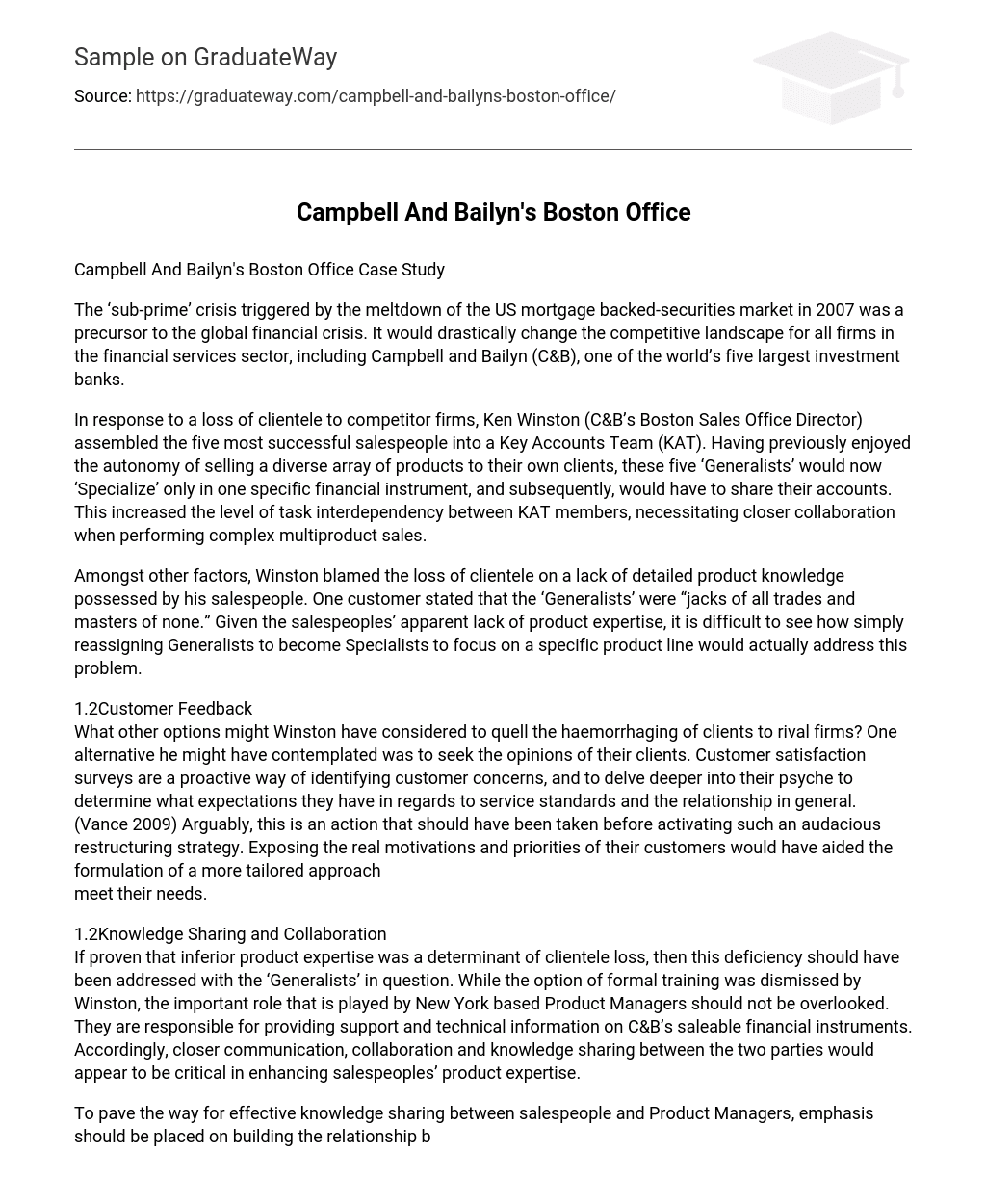The global financial crisis, which began in 2007 due to the meltdown of the US mortgage backed-securities market, had a significant impact on Campbell and Bailyn (C&B), one of the top five investment banks worldwide, altering the competitive landscape for all firms in the financial services sector.
In order to address a decrease in customers switching to rival companies, Ken Winston, the Director of the Boston Sales Office at C&B, formed a Key Accounts Team (KAT) consisting of the five most successful salespeople. Previously, these individuals were able to independently sell various products to their respective clients. However, they were now required to focus solely on one particular financial instrument as ‘Specialists’ and consequently had to share their client accounts. As a result, there was an increase in the level of interdependence among KAT members, necessitating closer collaboration when conducting complex sales involving multiple products.
Winston attributed the decline in customers to the salespeople’s limited understanding of the products they sell. A customer pointed out that the “Generalists” were knowledgeable in many areas but not experts in any. Considering the evident lack of product expertise among the sales team, it is unclear how shifting Generalists to become Specialists assigned to a specific product line would effectively solve this issue.
Customer Feedback
One possible solution that Winston could have considered to stop losing clients to rival firms is seeking feedback from their clients. Conducting customer satisfaction surveys is a proactive method of identifying customer issues and gaining a deeper understanding of their expectations regarding service standards and the overall relationship. (Vance 2009) Arguably, this should have been done before implementing a bold restructuring strategy. By uncovering the true motivations and priorities of their customers, Winston would have been able to develop a more customized approach to meet their needs.
meet their needs.
Knowledge Sharing and Collaboration
If it is proven that inferior product expertise led to client loss, then the deficiency should have been addressed with the ‘Generalists’ in question. Even though Winston dismissed the option of formal training, the importance of New York based Product Managers should not be ignored. These managers are responsible for providing support and technical information on C&B’s saleable financial instruments. Therefore, improving communication, collaboration, and knowledge sharing between the two parties is crucial for enhancing salespeople’s product expertise.
To enhance knowledge sharing between salespeople and Product Managers, it is important to focus on building a strong relationship between the two parties. Although their geographical dispersion can pose a challenge, the use of computer-mediated communication and virtual teams has been identified as an effective solution (Hertel, Geister and Konradt 2005). In addition, management should consider organizing occasional face-to-face meetings, workshops, and team building exercises (such as social activities) to further encourage positive exchanges and trust among the staff (Al-Ani, Horspool and Bligh 2011; Labrosse 2008).
Not only are C&B’s Product Managers a valuable source of specialized product knowledge, but the Specialists in Boston can also provide untapped expertise. Winston likely encouraged knowledge sharing between the Specialists and Generalists, benefiting both sales groups. Generalists would gain expertise in unfamiliar areas, while Specialists would expand their product knowledge beyond their specialty, enhancing career growth.
Previous perspectives on knowledge sharing in organizations suggest that employees may hesitate to share information or ideas with colleagues because they fear it will reduce their own power within the organization. However, this belief is now being challenged as the benefits of knowledge sharing, including innovation, productivity, and organizational efficiency, are recognized as outweighing any potential drawbacks.
The challenge for Winston is to facilitate knowledge sharing between his salespeople. The ‘Seven Methods of Influencing Behavior’ is a tool that can be used to develop knowledge sharing initiatives within organizations (Nevis, Lancourt and Vassallo 1996; quoted in Chait 2012). The most relevant methods available to Winston are ‘persuasive communication’ (influencing salespeople about the importance of knowledge sharing), ‘structural rearrangement’ (assigning Specialists to a Generalist in an assistant or subordinate role), and ‘role modeling’ (identifying key Generalists to take a leading role).
Conclusion
Winston is highly regarded and trustworthy, serving as a source of inspiration for many of his employees. However, it seems that his current approach could compromise this trust as it diminishes the independence, potential for advancement, and possibly the amount of commissions earned by his top sales staff. Although resistance to changes within an organization is to be expected, Winston had several alternative options that might have been more beneficial than his restructuring proposal. These alternatives include utilizing surveys and client feedback to effectively address customer requirements and encouraging greater information sharing and collaboration between Product Managers and the Sales team.
References
- Al-Ani, Ban, Agnes Horspool, and Michelle C. Bligh. 2011. “Collaborating with ‘virtual strangers’: Towards developing a framework for leadership in distributed teams.” Leadership 7 (3): 219-249. Doi: 10.1177/1742715011407382
- Hertel, Guido, Susanne Geister, and Udo Konradt. 2005. “Managing virtual teams: A review of current empirical research.” Human Resource Management Review 15 (1): 69-95. doi: 10.1016/j.hrmr.2005.01.002.
- Labrosse, Michelle. 2008. “Managing Virtual Teams.” Employment Relations Today 35 (2): 81-86. Doi: http://dx.doi.org/10.1002/ert.20205





